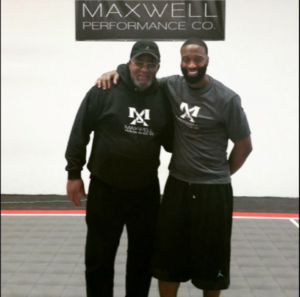This series highlights the unique and personal narratives of three black men and their relationships with fatherhood—both as a father and son. Terrence “Tyrie” Ivory, Malcolm Jackson, and Marcus Maxwell are all committed affiliated of the Mindful Life Project (MLP). Located in Richmond, MLP empowers underserved children through mindfulness and other transformative skills to gain self-awareness, confidence, self-regulation and resilience, which leads to lifelong success. The stories of Tyrie, Malcolm, and Marcus truly provide context towards their passion in working with children and building mindfulness.
The Story of Marcus Maxwell
Marcus James Maxwell and his family resided in Oakland, which was the place that his father, Samuel James Maxwell wanted to get them out of. Marcus recalls that his father had a disease—alcoholism. His father would use alcohol to escape the difficulties of marriage, his trauma, and other things. Thus, Marcus and his family sometimes had to pay the price via a short-tempered and abusive behaviors that persisted from his father. In few instances, it led Marcus to attending school battered, hoping that someone would ask what is going on at home. Marcus found therapy in football to take out his pain.
Marcus’s father was a “man’s man”, which he recalled including that he was never the one to show feelings, hug, kiss, or say “I love you”, but Marcus knew that he always did. His father took fatherhood as a job and was a provider for Marcus and his family to ensure that he did not grow up on the streets. His father would build cars, take Marcus to practice, and make sure that his work was done; even so, his disease would filtrate through those moments.
Marcus concluded that he didn’t want the relationship of he and his son, Austin James Maxwell, to be like this. Therefore, he continues to offer knowledge and tools to help him succeed, as well as continue to learn on his own, even though there is no playbook on black fatherhood. Marcus recognizes that he is tough on his son like his father, but he is a lot more loving. He works intentionally to combat the behaviors of his dad that come up in him.
Marcus now has a good relationship with his dad and has embraced the journey of their evolving relationship. During this journey, alcoholism led Marcus’s father to chase him out of his house and ended up on top of him, fighting. Because this, Marcus and his father did not talk for a year, which Marcus saw as a wake-up call for his dad. Simultaneously, Marcus had a wake-up call that once someone goes down that rabbit hole, their alcoholism could get bad, so he did not fault his dad for this. Thus, over time, Marcus decided to reach out to him, and his dad is now the strongest and most consistent person in his life. He then realized that his dad was always there in his life, but the focus on that was taken away because of his disease. His father now has issues with his thyroid, but he has quit smoking cold-turkey and he seldom drinks with better management.

What was one moment where you realized that being a black father was really difficult?
Marcus mentioned that he lives in the suburbs and would really love for his son to venture around and play outside. But, he realizes that he has to check on his son every five minutes to see where he is so that his son will not be accused of doing things or being in places that he is not “supposed” to be. With the racial climate that exists today, even living in the suburbs does not ease the mind of a black father over his son.

What is the best thing about being a black father?
Simply put, Marcus mentioned that the best thing is the culture and what everyone brings. The black community has a bond and history that all black fathers can relate to and have the ability to make everything their own.
Dear Father…
“Thank you. Because you showed me. You were there. Easily you could have not been there.”





